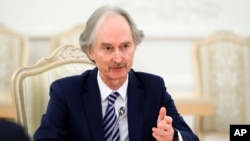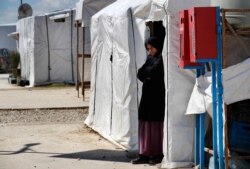The United Nations’ special envoy for Syria expressed “profound regret” that the organization has not yet been able to mediate an end to the conflict that turned a decade old Monday.
“The Syrian tragedy may go down as one of darkest chapters in recent history,” U.N. Syria envoy Geir Pedersen told the U.N. Security Council. “The Syrian people are among the greatest victims of this century.”
He noted that the civil war, which began with peaceful anti-government demonstrations in 2011 that were brutally suppressed by the regime of President Bashar al-Assad, has now lasted nearly as long as both World Wars combined.
“Most Syrian children have never lived a day without war,” he said. “Many have gone without food, medicine or education, or been detained, recruited for battle, injured or killed.”
More than a half million Syrians have died during the conflict and millions more have become refugees or been displaced inside the country. More than half the population is food insecure, and 9 out of 10 Syrians now live below the poverty level.
Pedersen ran through a long, tragic list of abuses and atrocities civilians have been subjected to during the past 10 years, including being bombed, displaced, starved and gassed.
“They have been injured, maimed and killed in every way imaginable – their corpses even desecrated,” he said, noting that perpetrators of actions that may amount to crimes against humanity or war crimes enjoy near-total impunity.
Turning calm into a cease-fire
The U.N. special envoy said there has been a relative but fragile calm in Syria for the past year. He urged the parties and key international actors to act swiftly to consolidate it into a real nationwide cease-fire, before the war becomes a frozen and protracted conflict.
While it is the Syrian parties who must negotiate a political settlement, Pedersen said international backing is vital.
“I am absolutely convinced that they will not progress far if a Syrian-led process is not supported by a constructive international diplomacy on Syria,” he said. “After all, this is among the most deeply internationalized conflicts of a generation, with many of the issues that matter most to the Syrians not even in Syrian hands.”
Syria’s U.N. ambassador, Bassam al-Sabbagh, did not mention the peaceful protests of 2011, but rather cast the Assad regime as the victim of a vast international conspiracy. He accused the United States, Britain, France and Turkey of launching an “unprecedented war of aggression” intended to weaken Assad’s government and military.
Washington’s envoy said the reason the war continues to drag on is that Assad has refused to engage in good faith.
“The regime has not taken a single step that would lay the groundwork for peace,” U.S. Ambassador Linda Thomas-Greenfield said. “So, we call on Russia to press the Assad regime to quit stalling. It’s time for the regime to address the conflict’s root cause: the basic demand of all Syrians to live in dignity, free from torture, abuse, and arbitrary detention.”
Russia, Assad’s main ally, has deployed its veto more than a dozen times to block sanctions and other actions that might have helped end the bloodshed during the past decade. It has also used that same power to reduce access to humanitarian aid that could assist civilians living in opposition-held areas of the country’s north.
Moscow has also supported the Syrian military since late 2015, at the time, rescuing Assad when he was on the brink of losing power.






